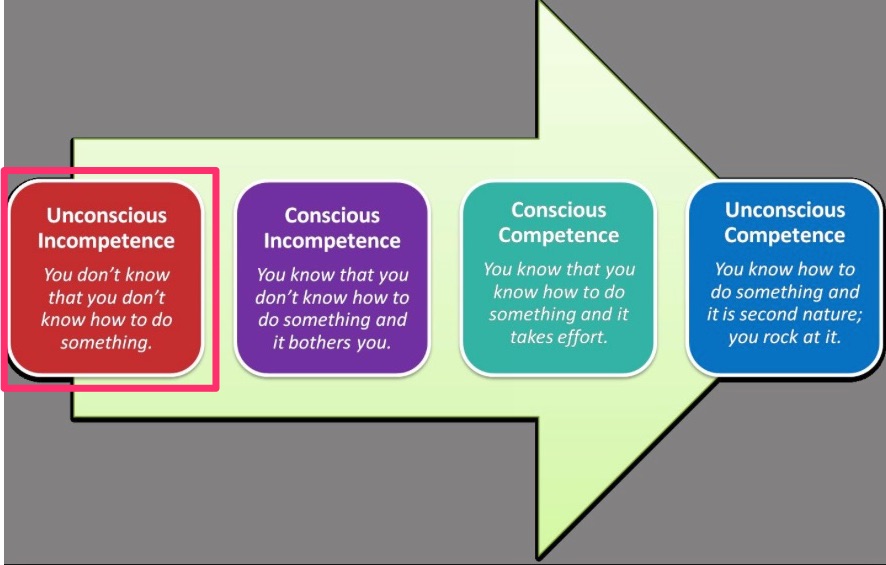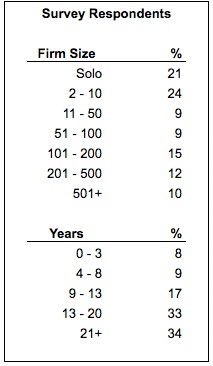
Much has been written about lawyers’ anxiety regarding their ability to generate business in today’s brutally competitive legal-service market. In 2013, we surveyed US lawyers to determine how anxious or confident they are. Mostly, they’re anxious. (We’re updating it now; see below.)
An overwhelming number of attorneys (89%) ranked themselves low to modest on having a steady stream of high-quality leads, yet 48% ranked their overall business development confidence level at 6 or higher (all ratings are on a 1-10 scale, with 10 highest). According to research psychologist Dr. John McCabe, this may be due to what is known as “self-presentation,” which is part of “impression management” theory.
A dichotomy
The implication here is that while answering the specific questions about specific business development challenges honestly, and grading themselves fairly low on the confidence scale for each, the overall impression they want to give the marketplace is quite different. This is part of what individuals and organizations do to maintain the desired public perception.
In another example of this, lawyers who had fewer years of experience tended to demonstrate a strong sense of security about their futures. Yet only a quarter of those respondents rated their ability to bring in the type and amount of business they want at 7 or above.
Other responses reinforce this dichotomy:
- In response to the question about having a steady stream of high-quality selling opportunities (leads), 69% ranked themselves a 5 or below, and only 11% rated their lead-generation at 8 or above.
- Only 15% say they convert a high percentage of sales opportunities into paying clients.
- Only 14% of responding attorneys claimed to have frequent invitations to write articles and speak at industry conferences, while 43% rated their speaking demand as modest, and 42% as low. Lawyers at firms larger than 501 attorneys were significantly more likely to be offered speaking opportunities than solo practitioners or those from firms of 2 to 10 lawyers, probably because large firms are more likely to have internal or external PR professionals securing speaking invitations on attorneys’ behalf.
- Asked about their referral networks, only 10% described theirs as robust; 90% said theirs was average or poor. Those who had expressed higher overall confidence in their business generation abilities were far more likely to say that they had a robust referral network. There was a strong correlation between these two survey questions.
- 80% of attorneys are not “well positioned” in a growing market segment (“known for the right things, by the right people”); 20% rated themselves 8-10 on positioning. Those with 9-to-20 years of practice were significantly more likely to feel that they are well-positioned than those with 4-8 years of experience.
- Only 18% said their business development skills make them feel completely secure about their futures.
- Asked their overall confidence level, 13% rated themselves as “calm and serene” (9-10 rating), whereas 23% put themselves in the “stomach-churning anxiety” category (1-3)
- Given the low level of confidence expressed overall, and about specific aspects of business development, it’s hard to reconcile that 56% of attorneys claimed to be “committed to spending a minimum of two hours per week to learn and practice business development skills.” Either they’re not honoring that commitment, or if they are, their sources of learning and practice aren’t effective.
Conclusions
The survey results suggest that most lawyers face confidence-sapping challenges generating- or converting sales opportunities, while putting forth a good face (self-presentation) to the marketplace. Larger firms may have more professional development programs to assist their attorneys in bringing in new business, but they’re either ineffective or not being utilized. And while just over half of attorneys expressed overall business development confidence above the midpoint, that’s not reflected in responses regarding specific business development tactics.
Respondents’ overall rating may be the measure of their visceral business development confidence. However, responses to the individual questions may be more of an assessment of their functional capability, e.g., the ability to
- attract prospects,
- convert prospects to clients,
- entice editors to publish them and organizations to choose them as speakers, and
- motivate contacts to refer them.
Unconscious Incompetence
One possible explanation may be that lawyers are not qualified to assess their  tactical capability. Part of this has to do with lawyers being at the first of the four stages of competence: Unconscious Incompetence, which is where we begin whenever we confront something new.
tactical capability. Part of this has to do with lawyers being at the first of the four stages of competence: Unconscious Incompetence, which is where we begin whenever we confront something new.
That means that we don’t know what we don’t know, and we may not even know that there is something to know. At this stage it’s common to exhibit overconfidence in our innate ability to perform because of our ignorance of what it actually takes to perform.
Here’s a common example. If I’ve never played golf before, I might say, “How hard can it be? Nobody’s playing defense, trying to interfere with your shot. There’s no shot clock, so you can take as much time as you need. Everybody has to be nice and quiet so you can concentrate. You don’t even have to be in shape. How hard can it be?” Because I’m ignorant of what it actually takes to play the game, I’m overconfident about my innate ability. (Once I go out on the course and try to hit the ball straight, I’ll quickly progress to Conscious Incompetence, where I may not yet know what I don’t know, but I definitely recognize that there’s more to know.)
The shift to a buyer’s market from a seller’s market
Whatever experience lawyers may have had generating business prior to 2008 was effectively erased then because conditions shifted to a Buyer’s Market from the 20-year Seller’s Market. Such a fundamental shift renders all previously successful business generation strategies and tactics ineffective, and everyone reverts to being a beginner, which means returning to unconscious incompetence. It’s similar to what happens in a newly-deregulated (and therefore newly competitive) industry. Students of business history will remember the clumsy initial marketing exhibited by the deregulated airline, banking and telecommunications industries, to name just a few. It took quite some time for those industries to learn how to compete, and it will take lawyers awhile, too.
If you don’t understand the what, why and how of marketing and sales strategies, tactics and skills, it’s pretty hard to assess how well you’re doing, and that’s not a formula for confidence. (It is, though, a formula for unfounded overconfidence.)
Resilience
 According to Dr. Larry Richard, generally acknowledged as the authority on lawyer personality, lawyers score very low on Resilience. They don’t like uncertainty, and they don’t bounce back well from setbacks. Their confidence is based on predictability. What could be less predictable and more uncertain than an industry long accustomed to a level of service demand that permitted lawyers to succeed without knowing anything about marketing or sales, but that now faces declining demand and increased competition? Everything that was true about getting business for so long is simply no longer true.
According to Dr. Larry Richard, generally acknowledged as the authority on lawyer personality, lawyers score very low on Resilience. They don’t like uncertainty, and they don’t bounce back well from setbacks. Their confidence is based on predictability. What could be less predictable and more uncertain than an industry long accustomed to a level of service demand that permitted lawyers to succeed without knowing anything about marketing or sales, but that now faces declining demand and increased competition? Everything that was true about getting business for so long is simply no longer true.
Given all that, we should probably be surprised that expressed confidence is as high as it is.
- Mike O’Horo
If you’d like a summary of the results of both the 2013 and 2019 surveys, plus prescriptive advice to understand your personal situation and what you need to do to be a more effective business generator, participate in this year’s survey.
*
[Mike O’Horo, known by thousands of lawyers as The Coach, is a serial innovator in the law firm business development world. His latest innovation is Dezurve, which has cracked the code on identifying investment-worthy lawyers and eliminating training budget waste.]